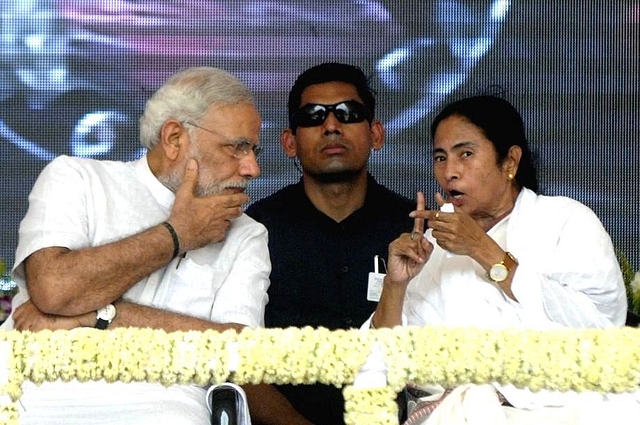
Mamata Headed For A Showdown With Centre? Hints At Blocking Visit Of Central Teams For Assessment Amid Reports Of Lockdown Violation
Reports emerge of wanton use of vehicles in public, unabashed religious gatherings in mosques, and crowded markets, in addition to violation of social distancing norms, prompting Central ‘intervention’.
In what can be construed as a big blow to the Bengal government’s assertions that the pandemic is under control in the state, the Union government has decided to dispatch two inter-ministerial teams to assess the ground situation and ‘suggest remedial measures’ to the state government.
The Union Ministry of Home Affairs (MHA), in yet another stern missive to Bengal, said that the Covid-19 pandemic is ‘especially serious’ in seven districts of the state, including Kolkata.
However, Bengal chief minister Mamata Banerjee has hinted at blocking the visit of the two central teams to West Bengal.
In two tweets late Monday afternoon, she said while she welcomes all "constructive suggestion and support especially from the Central Govt in negating the Covid 19 crisis", the "basis on which the Centre is proposing to deploy IMCTs.....is unclear".
Banerjee urged Prime Minsiter Modi and Home Minister Amit Shah to "share the criterion used for this" (sending the central teams).
"Until then I am afraid we would not be able to move ahead on this as without valid reasons this might not be consistent with the spirit of federalism,” she said.
The letter sent by the Centre noted that large-scale and wanton violations of lockdown restrictions and social distancing norms are happening in the seven districts, thus endangering public health and safety.
The seven districts named in the letter are: Howrah, North 24 Parganas, East Midnapore and Kolkata in south Bengal and Jalpaiguri, Darjeeling and Kalimpong in north Bengal.
While one inter-ministerial central team (IMCT) will visit north Bengal, the other will visit south Bengal.
The teams will visit hospitals where Covid-19 positive patients are being treated, examine stocks of PPEs, medicines and medical equipment and review treatment protocols.
The teams will also visit testing laboratories and quarantine centres, fair price shops and meet people to assess ground realities about distribution of foodgrains.
The teams will interact with healthcare professionals, general public and state officials. They will visit areas where lockdown violations have been reported from and speak to police officers there.
The teams will also review steps taken by the state government, including civic bodies, to control the pandemic on the ground.
The two teams have been constituted under the Disaster Management Act, 2005, and the state government has been asked to facilitate their visits to all areas that the teams would want to visit.
The Bengal government has also been asked to direct all its officials to extend full cooperation and assistance to the two teams, besides making adequate security arrangements for the IMCTs.
The two IMCTs will submit their assessment reports to the Union government at the earliest, following which the Centre will issue advisories to the state government. Under the Disaster Management Act, these advisories are binding on the state governments.
The MHA has pointed out that vehicles — both private and public — were on the roads in many areas of the state, religious gatherings were being allowed in mosques and market places were crowded, social distancing norms were being openly flouted in many areas and even in the ‘red zones’ of the state, people were out on the streets.
“Whereas, these incidents, if allowed to occur without any restraining measures in hotspot districts or emerging hotspots with large outbreaks or clusters, pose a serious health hazard, both to the population in the district and for those living in other parts of the country. After analysing the prevalence of such violations in major hotspot districts, it is clear to the Central government that the situation is especially serious in Kolkata, Howrah, Medinipur East, North 24 Parganas, Darjeeling, Kalimpong and Jalpaiguri districts in the state,” the MHA said in its missive addressed to the state chief secretary.
Each IMCT comprises five members from across different departments. The teams will also visit relief camps set up for the poor.